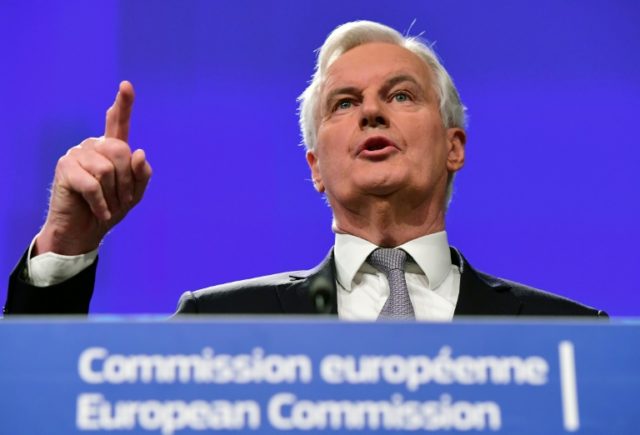Brussels (AFP) – The European Commission’s chief Brexit negotiator warned on Tuesday that time was short for talks, with a crucial deal for Britain’s departure from the EU needed by October 2018.
Frenchman Michel Barnier added it was “difficult to imagine” any interim deal giving Britain special treatment between its departure and a fuller trade pact further down the line.
The new timeline adds to the pressure on Prime Minister Theresa May as Britain’s top court holds the second day of a historic hearing to decide whether parliament has to approve the negotiations.
“Time will be short. It’s clear that the period of actual negotiations will be shorter than two years,” Barnier said in his first press conference since taking up the post in October.
Barnier has visited 18 EU countries in recent weeks to hammer out a common position on Brexit and aims to hold talks in all 27 apart from Britain by the end of January.
– ‘Less than 18 months’ –
The former EU financial services commissioner said that if May triggers the two-year divorce process under Article 50 of the EU’s Lisbon Treaty as promised in March 2017, then the window for talks will be tight.
“At the end, the agreement must of course be approved by the European Council and the European parliament, finally the UK will have to approve the agreement, all within the two-year period,” Barnier said.
“All in all there will be less than 18 months to negotiate — once again that is short,” he added.
“Should the UK notify the council by the end of March ’17 as Prime Minister Theresa May said she would, it is safe to say that negotiations could start a few weeks later and an Article 50 agreement reached by October 2018.”
Britain voted to leave the EU in a shock referendum result in June, but May is yet to set out London’s demands in detail, with the government seeking a balance between control over immigration and access to the EU’s single market.
In London, a spokesman for May admitted Barnier’s timetable was new.
“It’s the first that I have heard of it,” the spokesman told reporters.
“We haven’t actually triggered Article 50 yet so I’m not in a position to forecast a timetable for something that is going to be complicated.”
The complexity of unpicking Britain’s four decades in the EU and the threat of wider economic turmoil has prompted talk of a possible transition deal to soften Brexit.
But Barnier, who met Brexit minister David Davis last month for the first time, said Britain would have to lay out the full details of its long-term relationship with the EU before any interim deal was possible.
“As we don’t know what the UK wants and is waiting for, it’s difficult to imagine a transitional period,” he said.
The EU “needs to know what the new partnership with Britain would look like to weigh up the usefulness of a transitional period”, he added.
Barnier also warned Britain against “cherry-picking” what it wanted in terms of EU benefits despite leaving.
– ‘Different attitude’ –
His tough stance was backed by Eurogroup chief Jeroen Dijsselbloem, who called Tuesday for a “different attitude” from Britain “because the things I have been hearing so far are incompatible with smooth and incompatible with orderly.”
British Finance Minister Philip Hammond, who was in Brussels Tuesday, said he wanted “as smooth a process as possible” and confirmed that Britain could continue to pay for access to some parts of the single market.
May however faces her own problems with up to 40 lawmakers from her Conservative party threatening to back a motion in parliament demanding she publish her plan for Brexit before starting negotiations.
It comes as the government fights a legal challenge at the Supreme Court to stop parliament having the final say on a decision to trigger Article 50, which could delay the whole process.

COMMENTS
Please let us know if you're having issues with commenting.